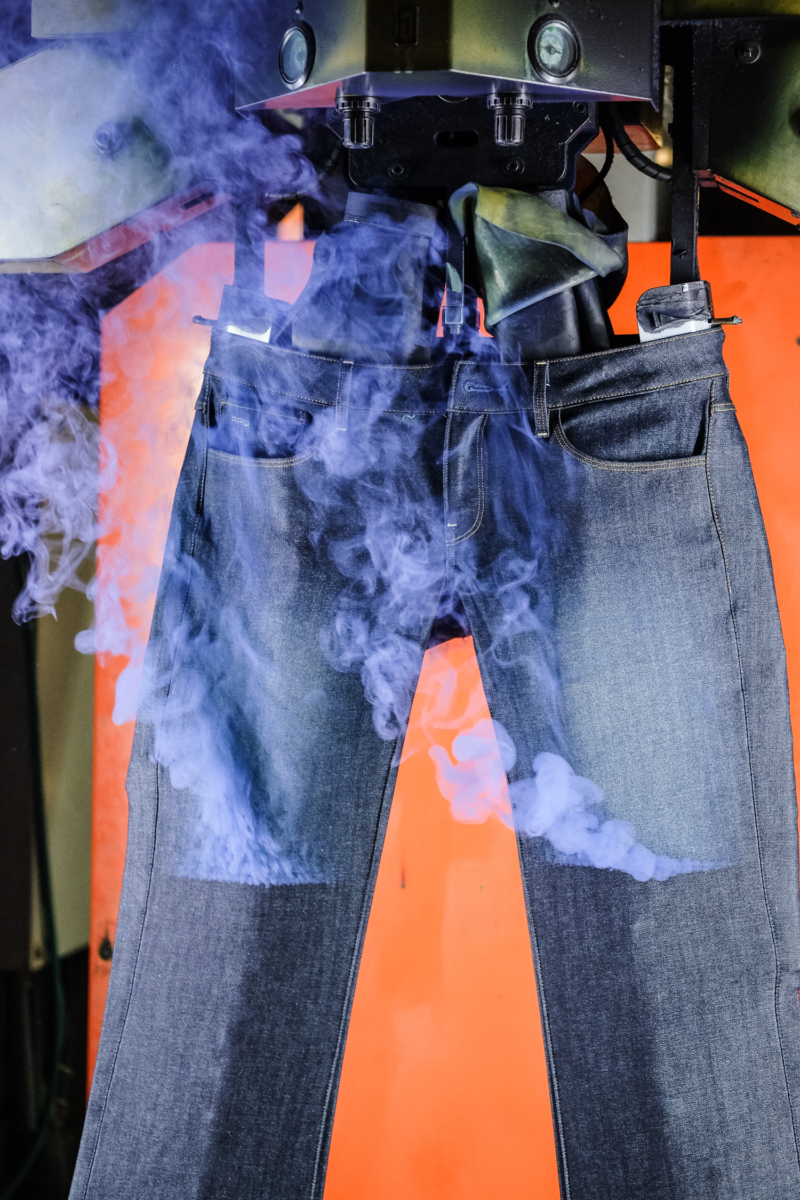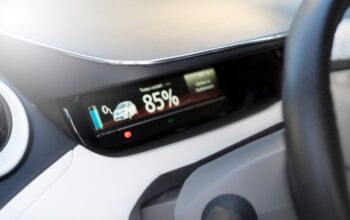Disclosure: As an Amazon Associate I earn from qualifying purchases. This page may contain affiliate links, which means I may receive a commission if you click a link and purchase something that I have recommended. There is no additional cost to you whatsoever.
This post contains some affiliate links, which means if you make a purchase, EcoCult receives a small percentage of the sale price. Some brands may have paid a small fee to be featured. We only recommend brands that we truly believe in. Support our editorial work by supporting them!
Jeans have a dirty reputation when it comes to labor and the environment, and it’s not entirely unearned.
To make a pair of real jeans (not jeggings or other fake denim) traditionally, the denim cotton fabric needs to be dipped up to eight times in a giant vat of indigo. Half the time, this indigo arrives at factories in powder form, exposing factory workers to dangerous amounts of aniline as they inhale it. In factories with older technology, jeans are put in belly washers, which can waste up to 1,500 liters of water per pair of jeans. If the wastewater isn’t properly treated before getting dumped in the local waterway, as in a denim manufacturing area in China called Xintang, it can lead to dangerous levels of lead, copper, and cadmium, and water with such a high pH it’s similar to ammonia.
If jeans are distressed or bleached, that process can also be toxic and dangerous for workers. Sandblasting can lead to silicosis and lung cancer. Bleaching and fading jeans using hypochlorite and potassium permanganate creates toxic fumes. Even hand-distressing jeans using power tools can create dust containing all the dyes and chemicals applied to the jeans.
But the good news is that the denim industry is one of the most innovative segments of the fashion industry, and it is possible to get a pair of jeans that are incredibly sustainable and untainted by the above issues. Here’s what you should look for:
Real denim: Real denim is close to 100% cotton fabric that is blue on the front where the indigo-dyed warp yarn shows, and white on the back where the undyed weft yarns show. Real denim, including blue, black, and white jeans, is dyed using non-toxic synthetic indigo (which is chemically identical to natural indigo) and sulfur black, which is considered a dye of least concern to human health. Non-denim pants that look like jeans but are made of synthetic fabrics, can be dyed with toxic or reactive dyes. They also don’t last as long as real denim, falling apart instead of breaking in.
![]()
![]()
Made in a technologically advanced denim mill: Sustainable brands like to brag about the suppliers they source from and the technology they use. You’ll hear the name of the mills Candiani in Italy, Saitex in Vietnam, or Denim Expert in Bangladesh. In these facilities, there are front-loading washers from Tonello or Jeanologia, which can cut water use by 70 to 80%. When you add in other efficient technologies and water recycling, a pair of jeans can be made with just 11 liters of water, and a reputable mill will carefully treat this water to make it completely clean before releasing it. There are lasers, robots, and enzymatic processes that can safely and quickly distress and fade jeans. There is foam dyeing technology, and dying technology that uses electricity to impregnate the yarns—both of these technologies avoid using powder indigo, and use a percentage of the water that traditional dye boxes use.
Made with sustainable cotton: Look for jeans that are made predominantly with cotton, with maybe a little bit of synthetic for stretch if you need it. Brands should know where their cotton is coming from, whether it’s from the U.S., from smallholder farmers in India, or from Turkey. Some brands go as far as working directly with the farmers. You want non-GMO cotton that is sprayed with little to no pesticides, and farms that use natural instead of synthetic fertilizers. Global Organic Textile Standard (GOTS) is the gold standard for certified organic cotton, but you could also look for Better Cotton Initiative (BCI) to see that brands are investing in improving cotton growing. Avoid jeans that are made in Asia from cotton without a provenance—there’s a good chance the denim was made with forced Uighur labor in China.
![]()
![]()
Made with fair labor: Look for certifications like Fair Trade, a nonprofit 501(c)3 organization that ensures the payment of fair and stable minimum prices for cotton to ensure health, housing, education, decent living wages for the supplier/farmer; and Fair Wear Foundation, an international non-profit organization that works with brands, factories, trade unions, governments, and non-governmental organizations to focus on and improve workplace conditions.
DIY distressing: A lot of the problems in denim come from the fact that consumers want to buy new jeans that look old. But the most sustainable thing you can do is get a classic pair of real denim jeans and have a decade-long relationship with them, breaking them in to your unique body shape through living your life.
Wash them well: According to Levi’s 2015 lifecycle analysis, 23% of the water use and 37% of the climate impact of a pair of jeans throughout its lifetime is caused by consumers washing and drying their jeans. But jeans don’t need to be washed after every wear (unlike synthetic fashion)! Hang them by the belt loop when you take them off for a few hours before you fold them up and put them away. You can go for as long as your jeans are stain-free—we promise they won’t get gross, science says so. Once they are dirty, wash them in cool water and hang them to dry, especially if they have any stretch.
Frank and Oak didn’t start out as a sustainable company, but it has gradually been implementing more eco-conscious practices and materials into its process over the last several years. Now, at least 50% of its materials are lower impact (so make sure to double-check materials before you buy!), such as recycled polyester, wool, hemp, natural cotton, cruelty-free insulation, and non-toxic dyes. It’s a certified B Corp that uses recycled and recyclable packaging, as well as other waste-reducing processes whenever possible. For its denim, you can shop by Fadeproof (which goes through a double-dyeing process), Circular Denim (made out of post-consumer recycled waste), Good Cotton (organic), or hydro-less (less water-intensive).
We have all felt the pure frustration of trying on pair after pair of jeans, only to leave the store with empty hands because nothing will fit right. Enter: LASSO. LASSO’s denim is totally different because it’s completely custom, but also affordable. You choose your style and color, then provide your measurements (it’s super easy with the helpful video they provide). Then, you get a pair of jeans on your doorstep within 7 to 9 business days that is a significantly better fit than anything you’d find off the rack. Plus, LASSO sources fabrics from Candiani and Global Denim, suppliers that are equally committed to sustainability (certified Standard 100 by OEKO-TEX and Cotton LEADS by the USDA). To top it all off, thr brand’s cute packaging is made from 100% recycled and recyclable materials. About 11 metric tons of greenhouse gasses are averted for every pair of LASSOs sold, and everything is made transparently in Los Angeles.
AMENDI believes in being “ultra” transparent so its customers can make a truly informed choice. Every pair of AMENDI jeans are traceable and come with a Fabrication Facts tag which outlines details of that specific jean, such as what each part is made of, amount of water used in production, certifications, a cost breakdown, and even how many people worked on them. All AMENDI jeans are made from 100% GOTS certified organic cotton, which ensures the health of the soul, local biosphere, and farmworkers. All of AMENDI’s cotton is grown, harvested, woven into denim, and sewn into jeans in the same country—Turkey. The brand works closely with its suppliers throughout the supply chain in order to keep an eye on both conduct and quality. By keeping its supply chain in one place, AMENDI is able to decrease greenhouse gas emissions and increase the quality of the product. Plus, the brand never uses harsh chemicals on its jeans and takes full advantage of the latest eco-friendly technologies. Learn more about its transparency initiatives here.
RevTown calls its denim “Decade Denim” because it’s meant to be durable enough to last a decade. The brand partners with the “greenest mill in the world” to make sure everything is produced under strict standards, and 100% of all waste is recycled into denim yarn or insulation for local housing. For color, its jeans are dyed using shrimp shells, orange peels, and nut shells. This process uses 30% less energy, 50% less water, and 70% fewer chemicals than traditional dying techniques across the industry. Not only that, but Revtown’s denim is made from Better Cotton, an initiative aimed at creating a cleaner, sustainable cotton production process. It ensures water is used efficiently, regulates the cotton’s soil health to meet high standards, and protects rights for farmers.
Despite the fact that Everlane has been facing growing criticism about how ethical they really are, EcoCult founder Alden has actually visited their denim factory, and it’s legit! It uses the Saitex factory, which is a denim manufacturer that is LEED-certified, recycles 98% of its water, relies on alternative energy sources, and repurposes byproducts to create premium jeans (minus the waste). You can find out more here. Everlane has a wide selection of styles for both men and women, so you can find the fit you love most.
The lifecycle of your jeans will be explained starting with an interactive map on Nudie Jeans’ website. You can click around to find out where products are manufactured, all the way down to the subcontractors. Nudie Jeans are made with 100% organic cotton primarily in Tunisia and Italy. Each supplier is written about in detail, with certifications, a downloadable PDF of their last audit, how often it’s audited, when the next one will be, the number of employees, and its website. Nudie offers a free repair service for its jeans, and they’ll even give you 20% off of a new pair when you send an old one back. This earns them the “Good Environmental Choice” Swedish eco label.
Just a note: they’re unisex! Read more about that here.
Warp + Weft creates a large collection of size-inclusive denim in a variety of colors and fits. This brand optimizes every step of the denim creation process, from spinning yarn to final detailing, so its manufacturing process uses 95% less water and only 1 kWh of energy. It also recycles 98% of the water used in manufacturing.
Urban Outfitters does sell a lot of fast fashion, but with its Urban Renewal collection, it began to shift its focus towards sustainability. Made in the USA, the company takes vintage pieces where no two are alike and upcycles them into fresh, new pieces for retail. There are a plethora of jean styles from boyfriend, to skinny, to “mom jean,” and a large portion of them are curated from Levi’s.
People Tree has been a pioneer in the eco and ethical apparel space for decades. Their newest collection of denim is made from GOTS certified organic cotton and uses 87.2% less water to produce than conventional cotton.
AG Jeans uses sustainable fibers such as TENCEL and Modal to manufacture its jeans, which you can shop for by fit on its website. “Ozone Technology” enables the brand to reduce its water consumption by 50% and excess fabric scraps are collected for recycling weekly. This estimated 1300 to 1400 pounds per week is then repurposed for car or home insulation. It’s also implemented heat-saving equipment to recycle heat from commercial dryers which reduces its laundry energy consumption by up to 46%.
Yes, Madewell and J. Crew finally have a line of fair trade jeans! This denim is Certified by Fair Trade USA, and “for every piece, a premium is paid into a Community Development Fund run by the people who make the clothes, helping them improve their lives in countless ways.” Made in the same Saitex facility as Everlane, above, the garments are dyed using natural ingredients instead of toxic chemicals in a factory that uses 75% less water and it committed to reducing their energy consumptions by 13M kilowatts of power per year.
In making their denim, ÉTICA reduces water usage by 90%, energy consumption by 63%, and chemical usage by 70% compared to industry standards. On a mission to help local communities, ÉTICA recycles its water for local farmland, compresses used wash stones into bricks for low-income housing, and partners with organizations committed to workers’ rights and environmental initiatives around the world.
Through its trademarked Water<Less innovations, Levi’s has saved more than 1.8 billion liters and recycled more than 129 million liters of water. (You can filter your denim search on their website to show the 40% of products that use this innovation.) It implements a Screened Chemistry standard in which it eliminates harmful chemicals from its supply chain, with a 2020 goal of 100% compliance. To avoid jeans going to the landfill, the brand has two options for you: the first includes its partnership with Give Back Box, where you pack up your old jeans and print a free shipping label, then drop it in the mail where it is sent to charity. The second option is to go vintage with Re/Done.
Outland Denim jeans are made in it’s own facility in Cambodia where their team oversees the holistic care of their staff through wage, training, and personal development initiatives. The brand is committed to sourcing the most ethically and environmentally sound raw materials, from organic cotton pocket linings to recycled packaging, and endeavors to verify its entire supply chain in alignment with the world’s best practices. It is also Australia’s first Certified B Corp denim brand!
DL1961 aims to take every initiative possible in order to decrease its environmental impact throughout the manufacturing process. It uses ethically sourced cotton and natural indigo dyes derived from plants, is powered by solar energy and its own in-house power generation plant, and uses less than 10 gallons of water (98 percent of which is recycled) instead of the 1,500 gallons that’s typically used to make a traditional pair of jeans. Not only that, but the brand uses state of the art machinery combined with an Environmental Impact Measurement (EIM) software that monitors every piece of denim made, tracking its water consumption and dye usage. DL1961 also gives all of its excess fabric to FABSCRAP, a non-profit that upcycles commercial textiles. Lastly, its packaging consists of a fully recyclable, compostable, and biodegradable kraft paper.
The Dutch brand Kings of Indigo mainly uses TENCEL, a man-made fiber from the wood pulp of eucalyptus trees, to make its jeans. Its denim is supplied from Italy, Turkey, or Japan, put together in Tunisia, and washed and finished in both Italy and Tunisia. Its Red Light Denim collection contains 21% recycled cotton made from old jeans worn and recollected in Amsterdam. The remainder is 7% hemp and 72% GOTS-certified organic cotton. When you make a purchase from Kings of Indigo’s online store, your shipment will arrive in recycled or biodegradable packaging. And at its headquarters in the Netherlands, 40% of the energy generated is through solar panels.
Armed Angels, from Germany, only uses sustainable and regenerative materials such as organic cotton, organic linen, organic wool, recycled cotton, Lenzing Ecovero and Tencel for its jeans, shirts, and sweaters and other basics. The whole brands has been GOTS certified since 2011, as is also Fair Wear and Fairtrade certified.
Of course, shopping secondhand is also an excellent option when it comes to both sustainability and affordability. Check out this post for our recommendations for where to look for secondhand and vintage denim!
![]()
![]()







